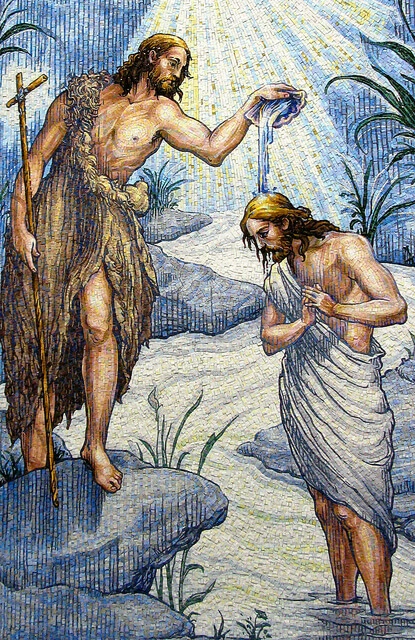533. As nothing more is related concerning Lamech than that he begat sons and daughters, which are the conceptions and births of such a church, we shall dwell no longer on the subject. What the births were, or the “sons and daughters” appears from the church; for such as is the church, such are the births from it. Both the churches called “Methuselah” and “Lamech” expired just before the flood.
John the Baptist

John the Baptist represents the natural, literal sense of the Bible. He and Jesus were cousins. He paved the way for Jesus, just as the literal sense of the Bible paves the way for the spiritual sense. John is described as a rough man clothed with camel's hair. The literal sense of the Bible can be rough and unpleasant as well. The fact that John lived in the wilderness speaks to the state of the Old Testament at the time. His message of repentance is the first step towards spiritual rebirth. (Arcana Coelestia 9372, 10528)
Yet even in its externals, the Bible stands above human-generated ideas: Jesus said John was "greater than a prophet," and prophets represent doctrine. "Those born of women" represent true ideas; John was the greatest of all. And the simple power of his message – a message of repentance – helped people examine and begin to fight their evils, preparing them for the love and goodness that Jesus would preach.
Arcana Coelestia #10528
10528. 'And I will send an angel before you' means that which is Divine and the Lord's, from which the Church and its worship spring. This is clear from the meaning of 'an angel' in the highest sense as the Lord's Divine Human, and in the relative sense as that which is Divine and the Lord's in heaven among angels, and also in the Church among people on earth, dealt with below; and from the meaning of 'sending before you' as preparing. For the meaning of 'an angel' in the highest sense as the Lord's Divine Human, see 1925, 3039, 6280, 6831, 9303, and in the relative sense as that which is Divine and the Lord's in heaven among angels, 1925, 2821, 4085, 6831, 8192. And from this it follows that 'an angel' also means that which is Divine and the Lord's among people on earth who receive it. For those people who have within themselves from the Lord the good of love to Him and the truths of faith in Him become angels after death; and those who become angels are also inwardly such while they live in the world. This is why John the Baptist is called 'an angel' in the Word, as in Luke,
This is he of whom it is written, Behold, I send My angel 1 before Your face, who will prepare Your way before You. Luke 7:27.
And the fact that 'angel' in this declaration means that which was Divine and the Lord's with him is evident in Malachi,
Behold, I send My angel, who will prepare the way before Me. And suddenly there will come to His temple the Lord whom you are seeking, and the angel of the covenant in whom you delight. Malachi 3:1.
The reason why that which is Divine and the Lord's is meant by 'angel' in this instance is that John the Baptist represented the Lord in respect of the Word, as did Elijah, and the Word is Divine Truth that comes from the Lord. (For Elijah, that he represented the Word, see Preface to Genesis 18, and 2762, 5247(end); and that John the Baptist did so, 9372.) And it is because the Lord's Divine Human is meant in the highest sense by 'angel' that the words 'there will come to His temple the Lord, and the angel of the covenant' are used. 'The temple' is His Divine Human, as is evident in John 2:18-23. Both expressions - 'the Lord' and 'the angel' - are used because He is called 'the Lord' on account of Divine Good and 'the angel' on account of Divine Truth. And it is because Jehovah in the Word is the Lord Himself that it says, 'I send My angel, who will prepare the way before Me', this being said by Jehovah.
Footnotes:
1. English versions of the Scriptures use the word messenger, the primary meaning of the Hebrew, Greek, or Latin word otherwise rendered angel.






